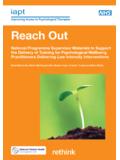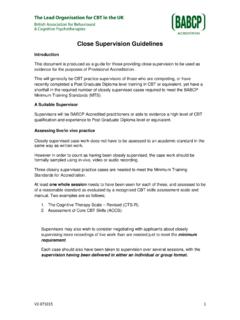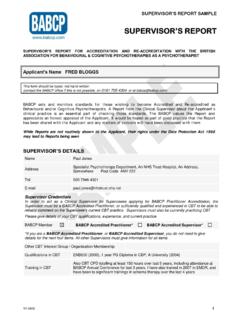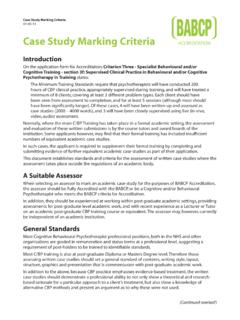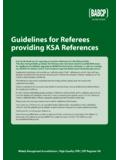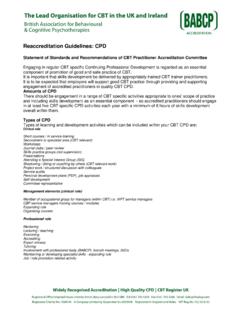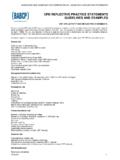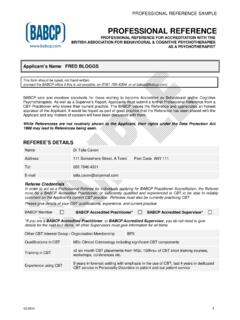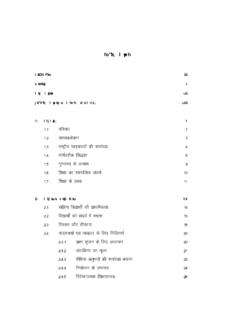Transcription of NATIONAL CURRICULUM FOR THE EDUCATION OF …
1 iapt NATIONAL CURRICULUM for PWP EDUCATION NATIONAL CURRICULUM FOR THE EDUCATION OF. PSYCHOLOGICAL WELLBEING PRACTITIONERS (PWPS). (Second edition, updated and revised, March 20111). Introduction The Improving Access to Psychological Therapies ( iapt ) programme was established across England in 2008 with the aim of establishing psychological therapy services to enable 900,000 extra people to receive evidence based, NICE. approved psychological therapies and interventions for common mental health problems (namely depression and anxiety disorders). A key part of the programme has been to develop a competent workforce to deliver the stepped care model in iapt services. PWPs assess and support patients with common mental health problems.
2 Principally anxiety and depression in the self-management of their recovery (further details about the PWP role can be found at ). Treatment programmes are designed to aid clinical improvement and social inclusion, including return to work, meaningful activity or other occupational activities. PWPs do this through the provision of information and support for evidence-based low-intensity psychological treatments, mainly based upon Cognitive Behavioural Therapy (CBT).Examples include providing support for a range of low intensity CBT self-help interventions such as behavioural activation, exposure, cognitive restructuring, panic management, problem solving, sleep hygiene as well as supporting CBT written self- help materials and computerised cognitive behavioural therapy (cCBT) packages.
3 Low-intensity psychological treatments place a greater emphasis on patient self- management and are less burdensome then traditional psychological treatments Support is specifically designed to enable patients to optimise their use of self- management recovery information and may be delivered through face-to-face, telephone, email or other contact methods. PWPs are expected to operate in a stepped care, high volume environment carrying as many as 45 active cases at any one time, with workers completing treatment for between 175-250 patients per year. 1. Your use of the content provided on the website at is subject to the terms of this Copyright Statement. The copyright in the content provided on this website including all curricula and text is owned by the Department of Health except where otherwise indicated.
4 Crown. All rights reserved.'. The curricula have been produced on the condition that they shall not, by way of trade or otherwise, be lent, sold, hired out or otherwise circulated in any form, binding or cover other than that in which they appear on this website and including this condition being imposed on any subsequent reader of the curricula. Provided that ownership of the Department of Health is fully acknowledged, all materials, text and curricula on this website may be freely copied for teaching and clinical purposes only.'. 1. iapt NATIONAL CURRICULUM for PWP EDUCATION PWPs also provide information on common pharmacological treatments and support patients in decisions which optimise their use of such treatments.
5 PWPs operate within the Improving Access to Psychological Therapies ( iapt ). service delivery model defined in the iapt business plan agreed by the UK Treasury Comprehensive Spending Review settlement in 2007. Subsequently in the document Realising the Benefits: iapt at Full Roll-Out (2010). the vision of completing the roll-out of iapt in 2011/12 and beyond has been outlined with further investment for Psychological Therapies EDUCATION and services announced. This delivery model requires the collection of routine, sessional clinical, social and employment outcomes as part of a NATIONAL outcome system. The performance of PWPs will, therefore, be measured through their clinical, social and employment outcomes.
6 Knowledge of iapt services including the stepped care model of service delivery, regular and routine clinical outcomes measurement, case management and supervision are generic competencies that PWPs are required to hold and the updated competency framework for anxiety and depression should be consulted The iapt service delivery model is predicated on stepped care with PWPs supporting low-intensity CBT interventions and high intensity workers delivering CBT. or one of the other iapt approved modalities: Brief Dynamic Interpersonal Therapy for Depression (DIT), Counselling for Depression, Interpersonal Psychotherapy for Depression (IPT) and Couple Therapy for Depression. It is important that PWPs have an understanding of the other modalities and how their work differs from high intensity interventions.
7 More information about the other modalities can be found at PWPs should operate at all times within the stepped care model of service delivery in which the iapt minimum levels of PWP supervision is provided. This should be both weekly individual case management and fortnightly clinical skills supervision in groups of no more than 12. The success of the programme crucially depends on the availability of fully trained practitioners who are able to supervise trainees to deliver the expected performance benchmarks for recovery. Guidance on the commissioning of supervision training and iapt supervision is available at ( workforce/supervisors/). Course accreditation standards for PWP EDUCATION have been developed based upon the NATIONAL PWP curricula courses/ iapt - Having the PWP course accredited by the British Psychological Society ensures there is fidelity to the CURRICULUM and that NATIONAL minimum levels of competency in the low intensity CBT clinical method are maintained.
8 The CURRICULUM should be available at both undergraduate and post graduate certificate level and based on a modular structure of four modules delivered over 45 days in total. This number of days is essential to meet the learning objectives specified within the CURRICULUM . Although each module has a specific set of foci and learning outcomes, the clinical competencies build module upon module and courses will be expected to focus the majority of their classroom activity on clinical competence development through clinical simulation/role play. All modules are assessed on participants practical demonstration of competencies. Skills based competency assessments are independent of academic level and must be achieved using a pass/fail criteria.
9 Participants will not necessarily possess previous clinical or professional expertise in 2. iapt NATIONAL CURRICULUM for PWP EDUCATION mental health and can undertake academic assessments at either undergraduate or postgraduate level, depending on their prior academic attainment. The training programme requires trainees to learn from observation while working in fully functioning iapt services, as well as through skills practice and theoretical teaching within the Higher EDUCATION Institute. Recommended Quality assurance criteria for the learning experience that iapt trainees receive in an iapt service' can be found on the iapt website ( +assurance+criteria+for+the+learning+. experience).
10 Equality and cultural competence Course objectives to acquire cultural competence align with statutory duties under the Equality Act 2010, requiring public authorities who exercise public functions and organisations carrying out public functions on behalf of a public authority, to advance equality of opportunity, eliminate unlawful discrimination and foster good relations between people of shared protected characteristics and those who do not. Achieving cultural competence is a lifelong learning process. Cultural competence for Psychological Wellbeing Practitioners will aim to develop the student's ability to recognise their own reaction to people who are perceived to be different and values and belief about the issue of difference (cultural competence module).
